

Define Intelligent at Dictionary. Verb + TO-infinitive. Dictionary. Online Practice Test for PET for Schools - Free Sample. Phrasal Verbs - Verbos Compuestos del Inglés (Verbos Frasales. Phrasal Verbs List. English Grammar Lessons. Have auxiliary verb - definition in the Learner's Dictionary.
Learning English - Talking Sport - Week 1: Usain Bolt. Learning English. I hope you find my grammar site useful, but grammar is only one part of learning English, or any language.
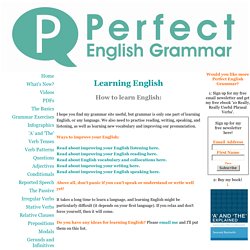
We also need to practise reading, writing, speaking, and listening, as well as learning new vocabulary and improving our pronunciation. Ways to improve your English: Read about improving your English listening here.Read about improving your English reading here.Read about English vocabulary and collocations here.Read about improving your writing here.Read about improving your English speaking here.
Above all, don't panic if you can't speak or understand or write well yet! It takes a long time to learn a language, and learning English might be particularly difficult (it depends on your first language). Do you have any ideas for learning English? English Vocabulary and Collocations. What is a collocation?
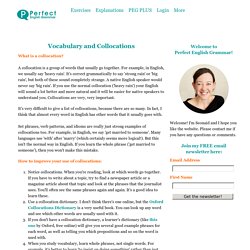
A collocation is a group of words that usually go together. For example, in English, we usually say 'heavy rain'. It's correct grammatically to say 'strong rain' or 'big rain', but both of these sound completely strange. A native English speaker would never say 'big rain'. If you use the normal collocation ('heavy rain') your English will sound a lot better and more natural and it will be easier for native speakers to understand you. It's very difficult to give a list of collocations, because there are so many. Set phrases, verb patterns, and idioms are really just strong examples of collocations too. How to improve your use of collocations: Notice collocations. Learning vocabulary: Hopefully I've convinced you that it's a good idea to learn phrases (groups of words) rather than single words. 1: FlashcardsI find this is really the best way to learn new words by a long way.
(Click here to go back to the main page about ideas on improving your English). English Grammar Lessons. Let's start off with the easy part. ' I wish to' can mean the same as 'I want to' but it is much, much more formal and much, much less common.
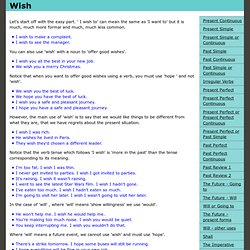
I wish to make a complaint. I wish to see the manager. You can also use 'wish' with a noun to 'offer good wishes'. I wish you all the best in your new job. List Of Adjectives. This is the place to get the Ultimate Lists of Adjectives.

The list of adjectives is something of wonder. Behold the modest adjective. An adjective can leap tall buildings in a single bound. It makes the average citizen smarter and kinder. An adjective keeps you in the cleanest car on the block. The right adjectives can help you win the war of words with wit, or capture a heart with elegant eloquence. Go straight to the Ultimate List of Adjectives OR read on for the grammatical rules of English regarding adjective usage including examples of the different types used, and the separated lists of adjectives by category (describing people, emotions, food, colors, amount, size and more). 24934-vocabulary-list-document.pdf. Student zones: Vocabulary zone (Worksheets) Future (going to/will/present continuous) > BEST RESOURCES: PLACEMENT TEST | GUIDE | OUR BEST WORKSHEETS | Most popular | Contact us.
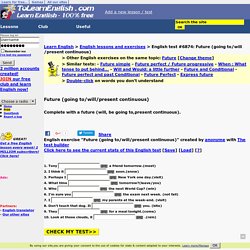
Inglés. Adverbs of frequency - Vocabulario para aprender ingl s. Perfect English Grammar. Adverbs of frequency. 'A Little', 'Little', 'A Few' and 'Few' (This is an extract from my book: A and The Explained) Download this explanation in PDF here.
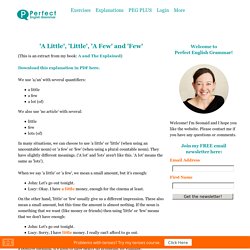
Bed / Home / Work / Town. (This is an extract from my book: Au00c2u0092 and u00c2u0091Theu00c2u0092 Explained) Download this explanation in PDF here.
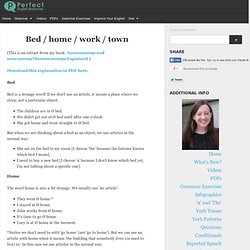
Bed Bed is a strange word! If we don't use an article, it means a place where we sleep, not a particular object: The children are in Ø bed.We didn't get out of Ø bed until after one o'clock.She got home and went straight to Ø bed. Home The word home is also a bit strange. They went Ø home. 'Will' or 'be going to'? PET for Schools Practice test. Preliminary English Test (PET): Practice Tests and Exercises from Flo-Joe.